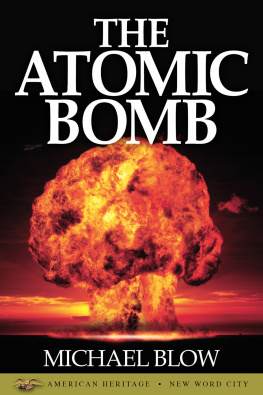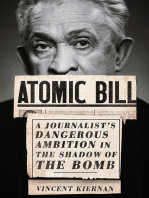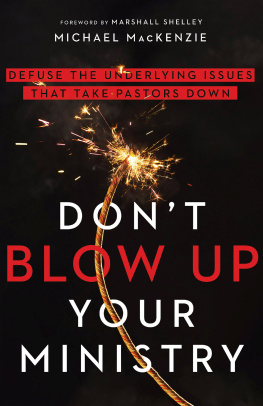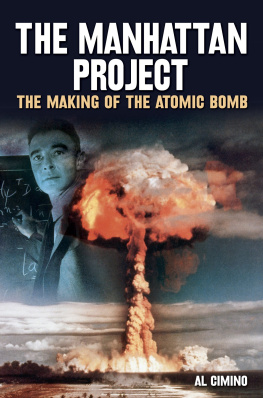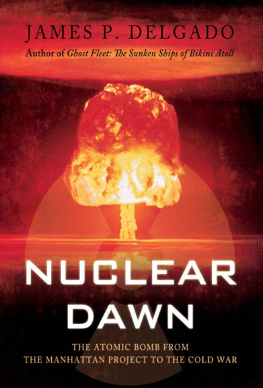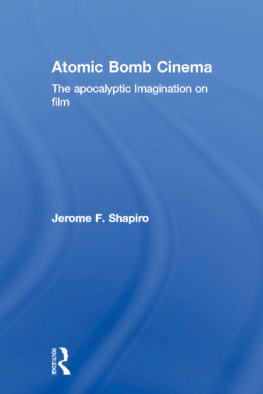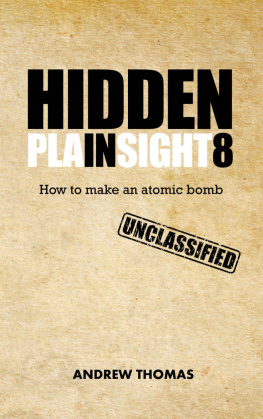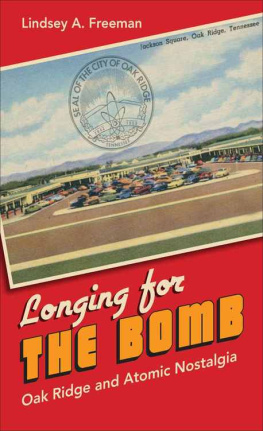Michael Blow - The Atomic Bomb
Here you can read online Michael Blow - The Atomic Bomb full text of the book (entire story) in english for free. Download pdf and epub, get meaning, cover and reviews about this ebook. year: 2018, publisher: New Word City, genre: Non-fiction. Description of the work, (preface) as well as reviews are available. Best literature library LitArk.com created for fans of good reading and offers a wide selection of genres:
Romance novel
Science fiction
Adventure
Detective
Science
History
Home and family
Prose
Art
Politics
Computer
Non-fiction
Religion
Business
Children
Humor
Choose a favorite category and find really read worthwhile books. Enjoy immersion in the world of imagination, feel the emotions of the characters or learn something new for yourself, make an fascinating discovery.
- Book:The Atomic Bomb
- Author:
- Publisher:New Word City
- Genre:
- Year:2018
- Rating:3 / 5
- Favourites:Add to favourites
- Your mark:
- 60
- 1
- 2
- 3
- 4
- 5
The Atomic Bomb: summary, description and annotation
We offer to read an annotation, description, summary or preface (depends on what the author of the book "The Atomic Bomb" wrote himself). If you haven't found the necessary information about the book — write in the comments, we will try to find it.
The Atomic Bomb — read online for free the complete book (whole text) full work
Below is the text of the book, divided by pages. System saving the place of the last page read, allows you to conveniently read the book "The Atomic Bomb" online for free, without having to search again every time where you left off. Put a bookmark, and you can go to the page where you finished reading at any time.
Font size:
Interval:
Bookmark:
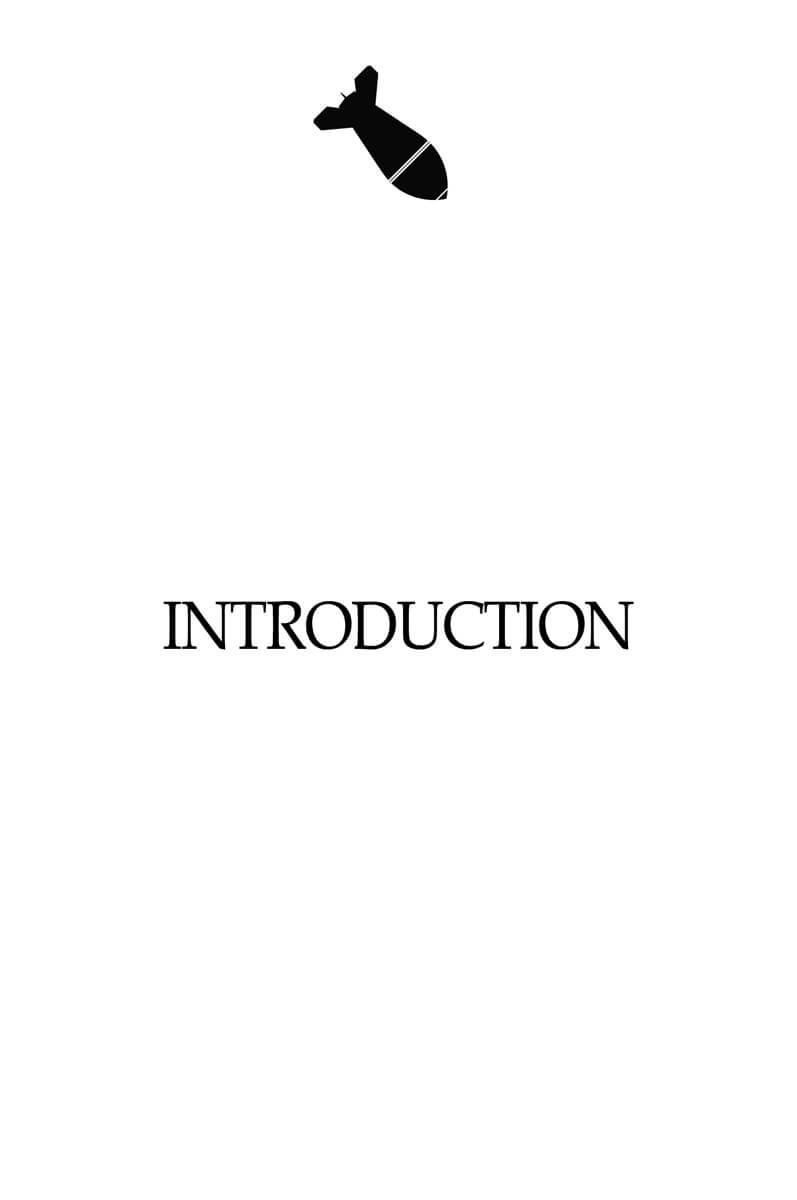
Seventy years ago, two-time Pulitzer Prize winner William L. Laurence first described the fearsome power of nuclear energy. The only reporter given access to the Manhattan Project during World War II , he became the de-facto historian of the Atomic Age .
The Lithuanian-born writer came to the United States in 1905 at the age of seventeen, took the oath of citizenship in 1913, and served with the U.S. Army Signal Corps during World War I . Beginning his journalism career in 1926 at The World in New York, he moved to TheNew York Times in 1930.
In May 1940, Laurence wrote a front-page story about the potential of nuclear power, attempting to galvanize American efforts to beat Germany in the race to develop the bomb. Five years later, he was summoned to a secret laboratory in the Los Alamos desert in New Mexico to watch the detonation of a nuclear weapon by the United States Army. His account, published in the Times in September, compared the event to the discovery of fire:
The Atomic Age began at exactly 5:30 mountain war time on the morning of July 16, 1945, on a stretch of semidesert land about 50 airline miles from Alamagordo, N.M., just a few minutes before the dawn of a new day on this earth.
At the great moment in history, ranking with the moment in the long ago when man first put fire to work for him and started on his march to civilization, the vast energy locked within the hearts of the atoms of matter was released for the first time in a burst of flame such as had never been seen on this planet, illuminating earth and sky for a brief span that seemed eternal with the light of many supersuns.
But it was not all flash and light. Within the 105-pound capsule was the power to kill and destroy on a scale previously unimaginable. Prior to the detonation in the New Mexico desert, the bomb existed only in theory. Three weeks later, the nuclear dream became Japans nightmare.
On August 6 and 9, in the last significant blows of World War II, American B-29 bombers dropped atomic warheads on the Japanese cities of Hiroshima and Nagasaki . Laurence observed the mushroom cloud that rose over Nagasaki from a U.S. Army plane sent to record and measure the blast: Awe-struck, we watched it shoot upward like a meteor coming from the earth instead of outer space, becoming ever more alive as it climbed skyward through the white clouds. It was no longer smoke or dust or even a cloud of fire. It was a living thing, a new species of being born before our incredulous eyes. The bombs leveled buildings for miles and together caused the deaths of at least 129,000 people.
Having found the bomb, we have used it, President Harry Truman said in his address following the Nagasaki bombing. We have used it against those who attacked us without warning at Pearl Harbor, against those who have starved and beaten and executed American prisoners of war, against those who have abandoned all pretense of obeying international laws of warfare. We have used it to shorten the agony of war, in order to save the lives of thousands and thousands of young Americans. We shall continue to use it until we completely destroy Japans power to make war. Only a Japanese surrender will stop us.
Within a week, the Japanese surrendered , formally ending the hostilities on September 2, 1945. The war was over, but the Atomic Age was just beginning.
In the decades to follow, atomic energy would come to represent hope and optimism for the future. In 1949, U.S. Atomic Energy Commission Chairman David Lilienthal said, Atomic energy is not simply a search for new energy, but more significantly a beginning of human history in which faith in knowledge can vitalize mans whole life. The notion that atomic energy could be harnessed to supply electricity, advance medicine, and even preserve food led to the construction of the United States first commercial nuclear power plant in 1958.
But atomic energy also has been the source of fear, disappointment, and disaster.
A showdown with the Soviet Union over nuclear weapons in Cuba brought the United States to the brink of nuclear war in 1962, escalating the arms race between the superpowers. The Cold War continued as both countries continued to build their arsenals until 1987, when President Ronald Reagan and Soviet Premier Mikhail Gorbachev signed the Immediate-Range Nuclear Forces Treaty , eliminating the threat of nuclear and conventional ballistic and ground range missiles. The fight to ban nuclear testing continues to generate distrust between the major world powers and conflict with developing nations.
The March 1979 meltdown at Pennsylvanias Three Mile Island and the April 1986 disaster at Chernobyl in the then-Soviet Union raised fears and dampened enthusiasm for the use of nuclear power. Though the United States remains the worlds largest producer of nuclear energy producing more than 30 percent of the worlds total each year most mark the end of the Atomic Age with the fall of the Soviet Union in 1991. Partial meltdowns in Japans Fukushima power plant caused by a tsunami in March 2011 led the Japanese to declare it would shut down all its nuclear reactors by 2030.
But in 1945, the atomic great ball of fire appeared to be the worlds destiny. More than 130,000 construction workers, plant operators, military personnel, and scientists - whose scruffy appearance led their commander, General Leslie R. Groves , to call them the longhairs worked to develop atomic energy. Overnight, entire cities grew up in the desert around the massive factories and research facilities. In little more than three years, the Manhattan Project cost the United States government nearly $2 billion the equivalent of about $26 billion today. Its completion, Laurence wrote, marked the climax in the penultimate act of one of the greatest dramas in our history and the history of civilized man a drama in which our scientists were working against time to create an atomic bomb ahead of our German enemy.
This is the story of the atomic bomb.
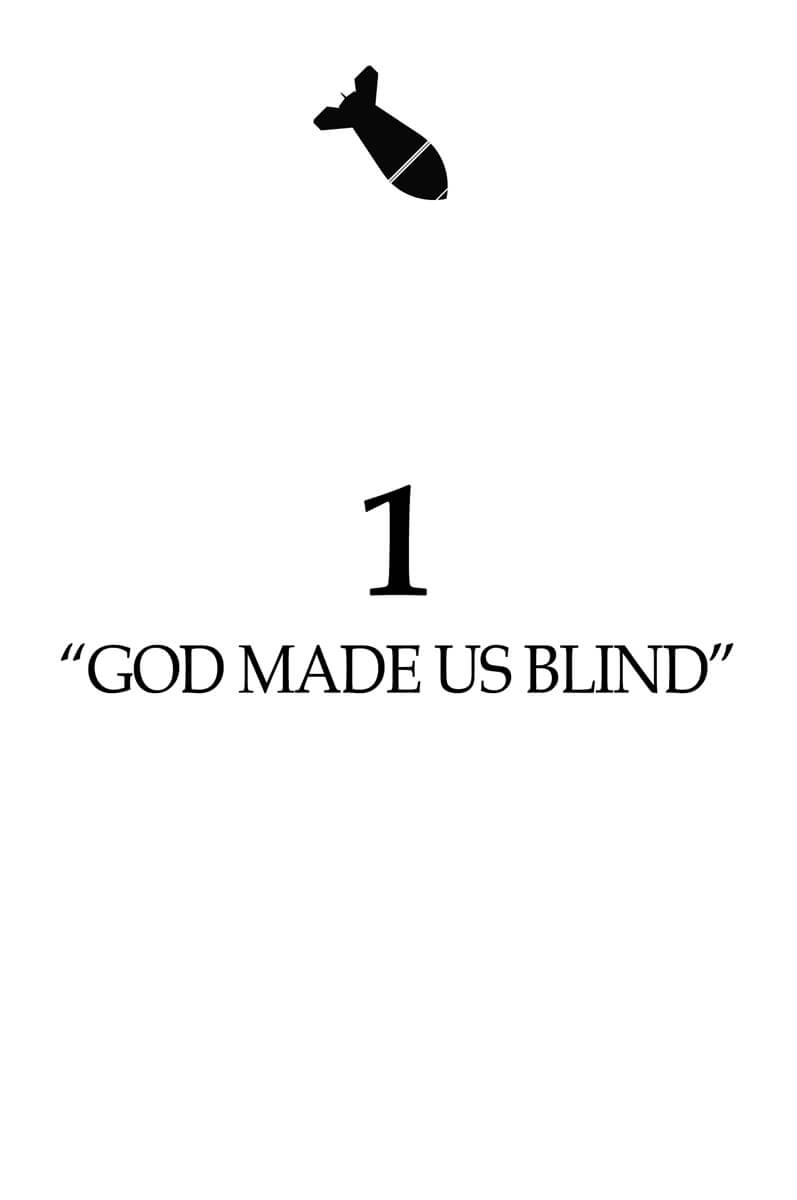
What was most striking about nuclear reaction, Otto Frisch told an astonished Niels Bohr , was the amount of energy liberated. Bohr clapped a hand to his forehead: How could we have missed it all this time?
The two physicists met on January 6, 1939, in Copenhagen, Denmark. Frisch, reporting the results of an experiment recently performed at the Kaiser Wilhelm Institute for Chemistry in Germany by Otto Hahn and Fritz Strassmann , told Bohr that he and his aunt, the Austrian physicist Lise Meitner , were convinced that the energy had been produced when a uranium nucleus burst apart under neutron bombardment. Bohr, whose work on the structure of the atom had won him a Nobel Prize in 1922, realized they were right.
It seemed like an obvious conclusion: Years of experiments had hinted that the nucleus of the atom could be - in fact, had been - split. How could they have missed it? Emilio Segr , who had helped split the atom without realizing it, later gave the best answer: It seemed, he said, as if God had made us all blind.
Yet the splitting of the atom was difficult to accept. Hahn felt that atomic fission would surely be against Gods will. It also violated all known laws of modern physics, as well as the conventional theory of the atom as a hard and impenetrable piece of matter.
In 400 B.C., the Greek philosopher Democritus speculated on the existence of particles so small that they could not become any smaller. He called these particles atoms, a combination of two Greek words meaning that which cannot be cut.
Font size:
Interval:
Bookmark:
Similar books «The Atomic Bomb»
Look at similar books to The Atomic Bomb. We have selected literature similar in name and meaning in the hope of providing readers with more options to find new, interesting, not yet read works.
Discussion, reviews of the book The Atomic Bomb and just readers' own opinions. Leave your comments, write what you think about the work, its meaning or the main characters. Specify what exactly you liked and what you didn't like, and why you think so.

